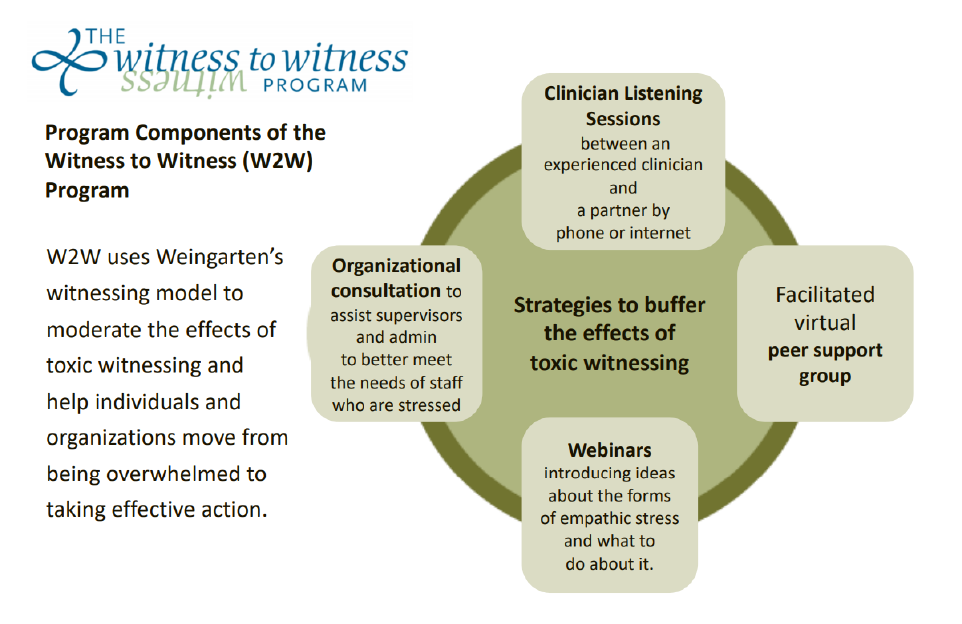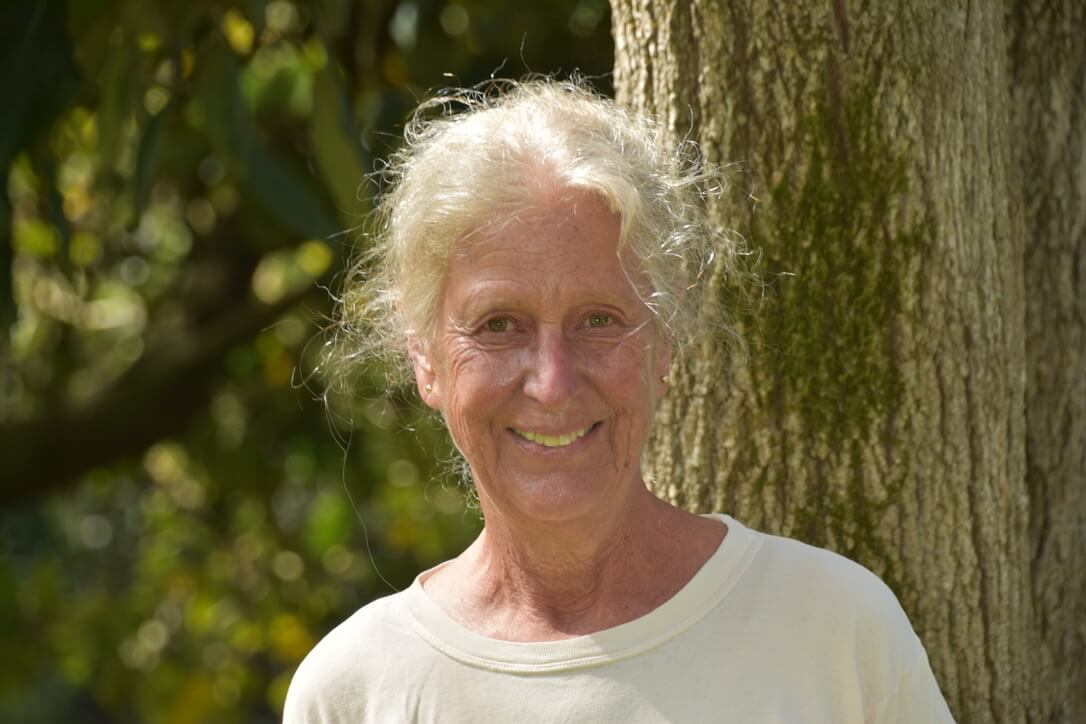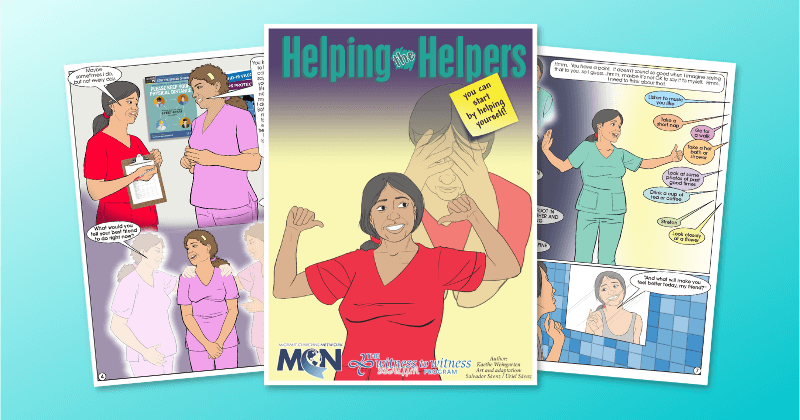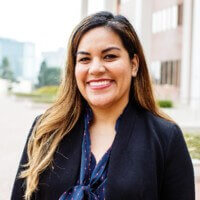Witness to Witness (W2W)

Mission
To build resilience both individually and organizationally for those working with historically marginalized populations.
Vision
Through our service and consultation programs, the Witness to Witness Program will be a standard of care to promote resilience individually and organizationally for people working with historically marginalized communities allowing them to flourish despite the demands of the work.
The Witness to Witness (W2W) Program serves those who are in high stress jobs working with vulnerable clients who are themselves experiencing high levels of stress. Originally designed to assist those working with asylum seekers, detainees, migrants, climate refugees and immigrants at the border, we have expanded to serve a range of providers in many parts of the country who work with vulnerable populations. Those we serve may be suffering from stress, empathic stress, moral distress and/or moral injury.
The Witness to Witness (W2W) Program of Migrant Clinicians Network (MCN) is affiliated and endorsed by the American Family Therapy Academy (AFTA).
To request an interactive webinar, peer support group, or learning collaborative for your organization, contact w2w@migrantclinician.org
If you want to stay informed about the W2W Program,
Resources
We have found that these articles are helpful to those who are dealing with the stress, empathic distress and moral injury resulting from their daily exposure to challenging work situations. Many people doing this important work feel inadequate to the tasks they face. They feel helpless to create the outcomes they want for the people they serve. Their distress is a symptom of their kind and compassionate nature. These articles provide a framework for understanding their situations and ways of relieving the distress.
Helping the Helpers
Available in English and Spanish
Introduction to the Witness Model
Introduction to the Witnessing Model - Common Shock: English and Spanish
What we do
The Witness to Witness (W2W) Program serves those who are in high stress jobs or volunteer roles where they come into daily contact with people who are themselves experiencing high levels
of stress.
Clinician Listening Sessions
The W2W program uses Weingarten’s witnessing model (see below) to provide 3-4 sessions of listening and resource building to partners -- health care professionals, attorneys, support staff, journalists, asylum officers, counselors, faith leaders, advocates and others -- who are committed to supporting immigrants yet are experiencing harms themselves. While the conversations may be therapeutic, we do not offer therapy.
Peer Support
Isolation is a common response to feeling overwhelmed. By contrast, social support is the most effective and efficient way to cope with stress. W2W offers facilitated open enrollment peer support groups for clinicians.
Interactive Webinars
W2W offers individualized interactive webinars and accompanying resources, each of which are archived. Topics may include but are not limited to: the witnessing model, empathic stress disorders, moral injury, individual resilience, organizational resilience, community resilience, vicarious resilience, creating trauma sensitive environments, reasonable hope, practical self-care strategies, team meeting debrief structures, and more.
Organizational Consultation
W2W provides targeted consultation based on initial organizational assessment. Workers describe “in-box trauma,” when they receive notification of new policies that will impact the work they want to do. W2W offers a multi-week, practical learning collaborative for supervisors and administrators to help them develop both individual and organizational resilience in a trauma-informed manner.

What Constituents Are Saying About W2W
Comments from W2W Partners
"The Witness to Witness program has offered me incredible individual, group, and organizational support. From individual monthly hour long phone conversations with an experienced, licensed psychologist to biweekly Zoom calls with fellow immigration law practitioners across the country, and webinars specifically targeted to help improve organizational resiliency and understanding empathic stress, the W2W program has become an invaluable resource for me as I continue to practice non-profit immigration law. I am so grateful to W2W for sharing their expertise and knowledge with those of us providing direct legal services to low-income immigrants and refugees across the country. W2W truly cares for the caregivers, and I could not be more thankful."
"I feel so grateful for this model, this way of working, and to you for implementing it…. I believe things would be different if everyone working here was receiving this kind of partnership."
"Five stars, two thumbs-up."
Comments from Interactive Webinars
"What a generous webinar! Thank you very much. The material is helpful to me personally and provides very useful content for developing a supportive program for our needy hospital staff to be enriched as well."
"Wonderful and applicable information presented thoughtfully and clearly by a compassionate subject matter expert."
"The workshop was very informative and educational. I took back very important points and concepts from this webinar."
"Thank you for the fantastic training! It was one of the best I have been to in years, super informative, relevant and helpful."
Comments from Peer Support Groups and Learning Collaboratives
"Each session brought me hope and clarity, so serving the community felt more attainable."
"Really appreciate that this topic has been so thoroughly explored, it really validates my experiences and helps me feel hope that I can be sustainable in my role."
Comments from Consultations
"Thank you for adapting the trainings to our specific programmatic needs. The trainings provided us with the time to step out of our day-to-day work and stress and process the emotional toll our jobs are taking on us. Thank you for you adaptability and in-depth knowledge of trauma-informed practices."
|
 |
About Kaethe Kaethe (pronounced Kay-tah) Weingarten, PhD, directs the Witness to Witness Program, a project of Migrant Clinicians Network, affiliated with and endorsed by the American Family Therapy Academy. Dr. Weingarten was an Associate Clinical Professor of Psychology in the Harvard Medical School Department of Psychiatry from 1981-2017 and a faculty member of the Family Institute of Cambridge where she founded and directed the Program in Families, Trauma and Resilience. She has published six books and over 100 articles and essays. Her book Common Shock: Witnessing Violence Every Day – How we are harmed, how we can heal won the 2004 Nautilus Award for Social Change. In 2002, she was awarded the highest honor of the American Family Therapy Academy, the award for Distinguished Contribution to Family Theory and Practice. She and her husband now live in Berkeley, where they moved in 2013 after 48 years in Boston, to be near their children and five grandchildren
|
|
|
About Celia Celia Jaes Falicov, PhD, Coordinator of Spanish Language Programs for the Witness to Witness Program, is clinical professor in the Department of Family Medicine and Public Health at the University of California-San Diego where she directs mental health services for immigrant populations in university sponsored free community clinics. She has presented widely on her work on immigration, cultural diversity and social justice. She is a Past President of the American Family Therapy Academy. She has received awards from the American Psychological Association, the National Latino Psychological Association, National Latino Social Work Association and the American Association of Marriage and Family Therapy. She was the recipient of AFTA' s Distinguished Contribution to Family Therapy Theory and Practice Award in 1997. Her publications include three edited books: Family Transitions (Guilford); Cultural Perspectives in Family Therapy (Aspen) and Multiculturalism and Diversity in Clinical Supervision. She is the author of Latino Families in Therapy (Guilford Press).
|
|
|
About Pamela Pamela Secada, MPH (she/her/ella) is a Peruvian immigrant and first-generation college student. She received her Master’s in Public Health: Healthcare Policy and Management at University of California, Los Angeles and her Bachelor’s in Anthropology and Chicana/o Studies from California State University, Fullerton. She is currently a doctoral student in the Doctor of Education, Organizational Change and Leadership program at the University of Southern California. Her dissertation focus is on examining organizational and leadership practices that have impacted employee wellbeing during the COVID-19 pandemic. Secada is passionate about advancing health equity and eliminating health disparities. Her professional career has focused on a wide range of health issues including substance use interventions, cultural competency curriculum, community health worker training, and health workforce diversity through educational equity. In 2018 she participated as a delegate for The International Association for Hospice and Palliative Care at the 71st World Health Assembly in Geneva, Switzerland where she spoke to all WHO Member States and advocated for including palliative care as a key component of essential health care services worldwide. Secada lives in West Hollywood, California with her partner and their rescue Pitbull, Rocco. When she is not at work or school, she enjoys watching movies, traveling, and spending time with her family and friends.
|
|
|
About Jessica Jessica Calderón (she/her/ella) currently lives in Austin, TX. As an undergraduate student, Calderón distinguished herself with outstanding technical and interpersonal skills. Coursework for her degree in psychology included work on cultural competence, mental illness, and human relations. Calderón joined MCN as an intern while attending Texas State University. During her internship, she worked with Roxana Pineda at Ventanilla de Salud at the Mexican Consulate, providing local Mexican citizens and other Latinos with health resources, and attending networking meetings with other local organizations interested in educating and informing about disease prevention. In 2019, Calderón graduated from Texas State University with a double major in Psychology and Spanish Literature. After graduation, Calderón was invited to return as a staff member to support MCN’s International Projects and Emerging Issues department. Calderón is pursuing her Alternate Entry Master of Science in Nursing (AE-MSN) program prerequisites and planning to apply to this program. Through the Psych/Mental Health Nurse Practitioner Program (PMHNP), she plans to provide primary psychiatric-mental health care at an advanced level to individuals of all ages and their families. Calderón seeks to specialize in working with client populations who have a history of trauma, abuse, attachment interruption, and family problems of origin. She believes that through meaningful work alongside patients, they can overcome or manage trauma and gain significant improvements in health, self-esteem, relationships, and general quality of life. Calderón was born in Tamaulipas, Mexico, where she resided until 12 when she moved to Austin, Texas, with her family. Besides work and school, Calderón is passionate about any activity that allows her to connect with nature: from kayaking to mountain hiking. She also likes to travel, art, music, books, and spending quality time with friends & family. As demonstrated by her consecutive participation in the Austin Half Marathon, Calderón loves challenges and is always ready to get out of her comfort zone. |




